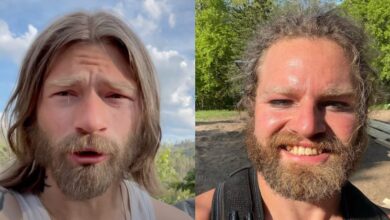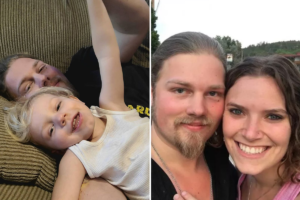⚖️💔 Shocking Fate! Joshua Brown’s Life Takes a Dark Turn—Forever Changed! 😢🚨
The Brown family of Alaskan Bush people has faced many challenges in the wilderness, but none quite as devastating as what Joshua Bam Bam Brown now faces. The second oldest son of the famous family has been sentenced, and the implications will last forever. Joshua Brown from Alaskan Bush People now faces a reality many fans never saw coming. As court documents reveal his fate, we dive into how things got so bad for the wilderness dwelling Brown family member and why this sentencing could mean saying goodbye forever to the life he once knew. A family’s wild legacy long before legal documents and courtroom appearances. Joshua Bam Bam Brown’s world was measured by the wilderness surrounding him. As the second son of Billy and Ammy Brown, Joshua grew up learning survival skills most children would never encounter. While other kids worried about homework and video games, Joshua mastered building shelters and tracking wildlife across Alaska’s rugged terrain. The Brown family lived off the grid in the Alaskan wilderness for decades, creating their unique way of life far from modern civilization. Billy Brown, the family patriarch, believed in freedom above all else.
Freedom from society’s constraints, bills, and bureaucracy. Freedom to live according to their own rules. This philosophy shaped Joshua from his earliest days, instilling in him an independent spirit. When the Discovery Channel discovered the Browns in 2014, producers expected to document simple wilderness survival.
Instead, they captured something more compelling. A family bound by love and determination, fighting against nature’s harshest elements. Joshua quickly became a fan favorite, known for his level-headed approach to challenges and his unwavering loyalty to family. Unlike his more impulsive brothers, Joshua often served as the voice of reason, carefully weighing options before making decisions. This thoughtful nature endeared him to viewers who saw the perfect balance of Bush wisdom and emotional intelligence in him. But living under the spotlight brought complications none of the Browns had anticipated. Their private struggles became public entertainment. Their mistakes, both innocent and serious, faced scrutiny from millions. And somewhere between the camera ready adventures and the hard reality of surviving in the wilderness, lines began to blur between the life they lived and the life they portrayed.
Trouble on the horizon. For years, the Brown family had benefited from Alaska’s permanent fund dividend program, which distributes a portion of the state’s oil revenue to qualifying residents. To receive these payments, applicants must live in Alaska yearround and maintain permanent residency. As the Alaskan Bush people gained popularity, questions about the family’s actual whereabouts during filming began to surface.
Sharp-eyed viewers noticed inconsistencies in the show’s timeline.
Social media posts placed family members outside Alaska during periods when they claimed residency. While the Browns described themselves as nomadic bush people moving their camps through Alaska’s wilderness, state investigators started building a different narrative.
One that suggested the family spent significant time in the lower 48 states while continuing to collect Alaska’s oil dividends.
The investigation intensified when officials examined travel records, credit card statements, and witness testimonies. Documents revealed that between 2009 and 2012, the period under scrutiny, multiple Brown family members had spent more than 180 days per year outside Alaska, disqualifying them from receiving the dividend payments they’d continued to collect. Joshua’s involvement became particularly problematic.
As an adult filing his dividend applications, he had personally certified his continuous Alaskan residency. Each form carried warnings about the penalties for false statements. Each signature represented a legal commitment to the truth of his claims, and according to investigators, each application contained information that simply didn’t match reality. The family initially dismissed the allegations as misunderstandings.
Billy Brown insisted they had always considered Alaska their home, regardless of temporary travels. Joshua echoed his father’s defense, arguing that their nomadic lifestyle made traditional concepts of residency difficult to apply to their situation. But as evidence mounted, the legal ground beneath them began to shift. The investigation deepens. Routine questions about paperwork quickly evolved into a full-scale fraud investigation.
Alaska state troopers combed through years of records, interviewed witnesses, and precisely tracked the Browns movements. The investigation revealed a pattern prosecutors found deeply troubling. The family had collectively received more than $20,000 in dividend payments during years when they didn’t qualify. For Joshua Brown specifically, the focus narrowed to approximately $8,000 in payments received over four years. While this might seem a relatively small sum compared to the family’s television earnings, state prosecutors viewed the case as a matter of principle, Alaska’s dividend program operates on an honor system with residents trusted to report their eligibility truthfully. Violations undermine public trust and divert funds from legitimate recipients. The family’s growing fame complicated matters further. As the Alaskan Bush people gained viewership, footage from the show became potential evidence. Episodes filmed in Washington, Oregon, and other states directly contradicted residency claims filed during the same periods. The documentary series meant to celebrate their wilderness lifestyle had inadvertently created a paper trail that authorities could follow. Joshua found himself in a particularly difficult position. Unlike some of his younger siblings who could argue they were following their parents’ lead, he was an adult making independent legal declarations, his signature appeared on multiple applications containing what investigators now characterized as false statements. As the investigation intensified, Joshua’s options narrowed. The evidence against him grew more substantial with each passing week. State prosecutors prepared charges of falsification and theft, serious allegations that carried potential jail time. For a family that prided itself on living honorably, the prospect of criminal charges represented more than just legal jeopardy. It threatened the core identity they had built, both on and off camera. Day in court. The Juno courthouse starkly contrasted with the wilderness freedom Joshua Brown had known his entire life.
Polished marble floors replaced forest undergrowth. fluorescent lights substituted for starlight. On that pivotal morning in 2016, Joshua entered wearing what appeared to be his first ever formal suit. The collar visibly uncomfortable against his weatherbeaten neck. Billy Brown walked beside him, both men uncharacteristically silent as cameras clicked around them. The father and son, who had faced bears, blizzards, and isolation, now confronted a different kind of wilderness, the Alaskan legal system. The judge presided over proceedings with a steady gaze that seemed to cut through the television mythology surrounding the Browns. The courtroom fell silent as prosecutors outlined their case, deliberately falsifying residency documents to obtain state benefits illegally. These defendants didn’t make simple mistakes, the prosecutor stated. They systematically claimed Alaska residency while living elsewhere, taking money meant for genuine residents struggling with the high costs of northern life. Joshua’s attorney argued for leniency, emphasizing his clients limited formal education and dependence on his father’s guidance. Mr. Brown was raised in isolation, taught to trust family above all else. When his father directed him to sign those documents, he did so without fully understanding the legal implications. This defense strategy subtly shifted blame toward Billy, creating tension between father and son as they sat at the defendant’s table.
During cross-examination, Joshua maintained remarkable composure. When asked why he signed the residency forms despite extended absences from Alaska, he responded, “My father taught me that home isn’t just where you sleep. It’s where your heart lives. Alaska has always been our true home, even when circumstances forced us elsewhere. While emotionally compelling, the answer did little to address the legal standards for residency. The judge’s expression remained unmoved. The pivotal moment came when prosecutors displayed Joshua’s signature on multiple dividend applications alongside time-stamped photographs showing him in Washington State in California during periods when he certified being in Alaska.
The evidence formed an insurmountable contradiction to the wilderness narrative that had defined his public identity. As the final exhibit was entered into evidence, Joshua closed his eyes briefly, shoulders slumping under the weight of what was coming. The verdict would soon follow, carrying consequences far beyond the immediate legal penalties. The sentence falls. The courtroom fell silent as the judge prepared to deliver his verdict. The prosecution and defense had presented their final arguments, and now the moment of judgment had arrived. For Joshua Bam Bam Brown, standing beside his father, Billy, at the defendant’s table, this moment represented the culmination of a lengthy investigation that had exposed details of the Brown family’s lives to public scrutiny. The judge began by summarizing the charges.
Falsification of application for permanent fund dividends and unsworn falsification in the second degree. The evidence presented was substantial.
Travel records showing extended periods outside Alaska, financial transactions in the lower 48 states, and testimony from individuals who had seen the Browns far from their purported Alaskan residents during periods when they claimed to be living in the state. The court finds the evidence compelling and conclusive,” the judge stated, his voice carrying through the hushed room. “The defendants knowingly submitted applications containing false information regarding their residency status, and on that basis received funds to which they were not entitled under Alaska state law.” With these words, Joshua Brown was officially found guilty. The reality TV star who had built his reputation on wilderness authenticity now stood convicted of defrauding the state he claimed to call home. The irony wasn’t lost on observers in the courtroom, several of whom later described the moment to reporters as profoundly uncomfortable. The judge then moved to sentencing, articulating each component with deliberate clarity. First came the jail time, 30 days to be served in full without option for early release or home confinement. For someone who had spent his life roaming freely across Alaska’s vast wilderness, the prospect of confinement within concrete walls represented a punishment beyond just inconvenience. It meant separation from the natural world that had shaped his identity since childhood. The court recognizes that incarceration may be particularly challenging for individuals accustomed to an unconventional lifestyle, the judge noted. However, the integrity of the permanent fund dividend program requires meaningful consequences for deliberate violations. Next came financial penalties. Joshua would need to repay the approximately $8,000 received in improper dividend payments, plus additional fines and court costs.
Court documents later revealed that the total financial obligation exceeded $10,000 when all penalties were included. These sums represented significant hardship for a family that had often lived hand-to-mouth before television fame. More than the monetary value, however, the repayment carried symbolic weight, an official declaration that those funds had never rightfully belonged to them. Some longtime Alaska residents in attendance nodded approval at this portion of the sentence. The permanent fund dividend represents a shared resource many Alaskans depend upon for essential needs. Diverting these funds through false claims isn’t viewed as a victimless crime, but as theft from the community itself. The judge also ordered 40 hours of community service to be completed within 6 months of release. This component aimed at rehabilitation rather than punishment, offering Joshua a chance to contribute positively to the same community he had wronged through his false claims. Court records indicate this service would need to be performed in Alaska, requiring Joshua to return to the state after his release. Community service provides an opportunity to make amends beyond mere financial restitution, the judge explained. It’s a tangible way to give back to the Alaskan community. However, the most lasting element of the sentence came when the judge addressed future eligibility, permanent ineligibility for future dividend payments. With these words, Joshua Brown was effectively sentenced forever to exclusion from a program representing all Alaskans shared heritage. Long after the jail time ended and the fines were paid, this prohibition would remain, a perpetual reminder of past mistakes. Legal experts later explained the significance of this permanent ban. While most penalties in the justice system have definite end points, jail terms conclude, probation periods expire, even most financial obligations eventually get fulfilled.




